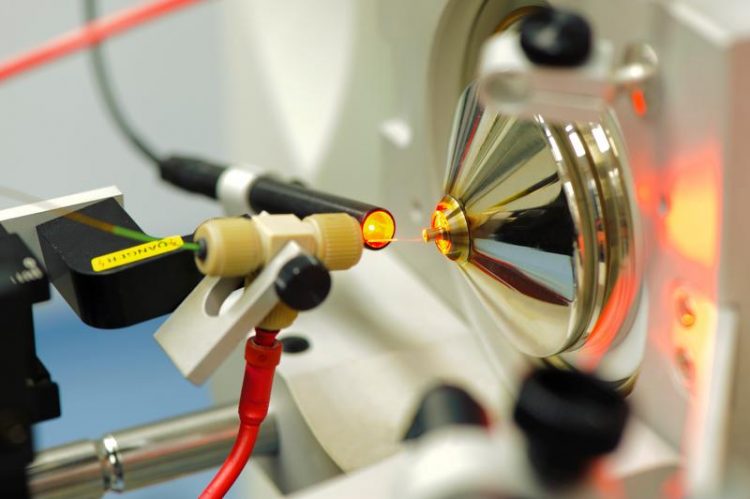CLINSPECT-M: Clinical mass spectrometry center for molecular brain research in Munich

Entrance to the mass spectrometer Wolfgang Filser / TUM
Mass spectrometry permits the simultaneous and quantitative determination of minute quantities of thousands of biomolecules from tissues or body fluids. Such molecular profiles for proteins will now be brought into clinical use for the first time.
New insights into the diagnosis and monitoring of disease
Munich is one of Germany's leading centers of neuroscience. The scientists involved in the new consortium intend to demonstrate that mass spectrometric protein analysis is suitable for the detection of clinically usable biomarkers.
The partners involved are TUM and its University Hospital ‘rechts der Isar’, the Ludwig-Maximilians-Universität München (LMU) with its University Hospital, the Helmholtz Zentrum München and the Max Planck Institute of Biochemistry. The partners will initially be funded with approximately 6 million euros over the next three years.
“As a core element of ‘TUM Agenda 2030’ – our strategic vision for the future –, this powerful cooperation in the clinical neurosciences constitutes a significant advance in systematically uniting Munich researchers as part of our ONE MUNICH strategy,” says Prof. Thomas F. Hofmann, President of TUM.
The members of the consortium ‘Clinical Mass Spectrometry Center Munich (CLINSPECT-M)’ see an extremely high demand for biomarkers for diagnosis, therapy decisions and monitoring of therapy response.
Everything revolves around the brain
The Clinspect-M network covers four major areas of application in medicine:
◾Multiple sclerosis: protein profiles of the cerebrospinal fluid of 4,000 patients should help physicians to find disease-specific fingerprints that can be used in clinical diagnosis.
◾Alzheimer's disease: clinical studies involving hundreds of patients will be used to find biomarkers that indicate whether a drug is effective or not.
◾Stroke: the examination of thousands of patient samples will identify proteins that indicate brain damage caused by a stroke and distinguish stroke from other causes.
◾Brain tumors: hundreds of cancer patients are examined with the aim of finding molecular targets for personalized therapy decisions.
“By using bioinformatics to bring together medical information and data from mass spectrometry, we will gain a better understanding of the complex interrelationships between these diseases and translate this understanding into medical practice,” explains co-spokesperson Prof. Daniel Teupser, Director of the Institute of Laboratory Medicine at LMU.
More information:
With its initiative “Research Nodes for Mass Spectrometry in Systems Medicine”, the BMBF (Federal Ministry of Education and Research) supports the implementation of the latest technologies in medical practice. In a highly competitive procedure, four consortia from Munich, Berlin, Heidelberg and Mainz were selected from around 30 applicants.
In addition to BMBF funding, the project also receives financial support from the Free State of Bavaria, TUM and LMU.
Prof. Dr. Bernhard Küster
Technical University of Munich
Chair of Proteomics and Bioanalytics
phone: +49-8161-7-5696
kuster(at)tum.de
https://mediatum.ub.tum.de/1537625 (high resolution images)
https://www.synergy-munich.de/index.html (The Excellence Cluster Synergy is also a cooperative venture between TUM and LMU.)
Media Contact
All latest news from the category: Physics and Astronomy
This area deals with the fundamental laws and building blocks of nature and how they interact, the properties and the behavior of matter, and research into space and time and their structures.
innovations-report provides in-depth reports and articles on subjects such as astrophysics, laser technologies, nuclear, quantum, particle and solid-state physics, nanotechnologies, planetary research and findings (Mars, Venus) and developments related to the Hubble Telescope.
Newest articles

Durable, Efficient, Sustainable: The Rise of Cerium Oxide Thermal Switches
Groundbreaking cerium oxide-based thermal switches achieve remarkable performance, transforming heat flow control with sustainable and efficient technology. Cerium Oxide-Based Thermal Switches Revolutionize Heat Flow Control Thermal switches, which electrically control…

How Industrial Robots are Reducing Emissions in Global Manufacturing
A new study explores the intersection of industrial automation and environmental sustainability, focusing on the role of industrial robots in reducing the carbon intensity of manufacturing exports. The research demonstrates…

Patients Can Heal Through Precise, Personalized Bioceramic Grafts
A recent review is transforming the landscape of craniomaxillofacial bone regeneration with the introduction of personalized bioceramic grafts. This pioneering research explores the fabrication and clinical potential of synthetic grafts…



